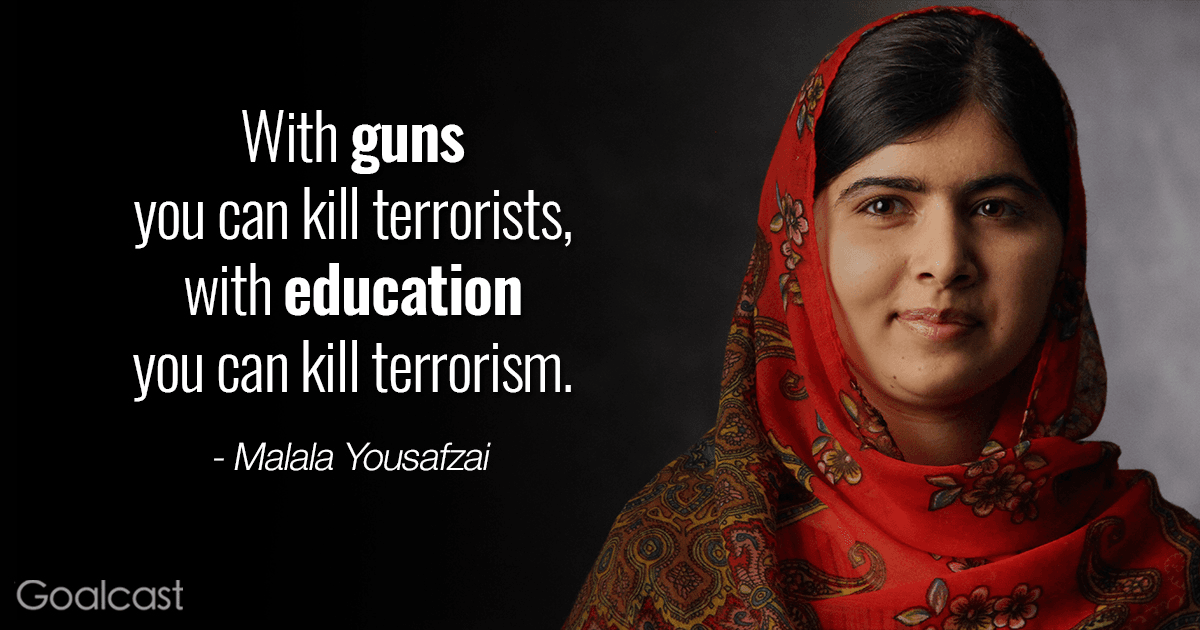Everyone gets a little down in their life sometimes. Rather than searching the internet for cat pictures or drowning your sorrow, let’s looking at our 10 best inspirational stories that we’ve prepared for you to pull you from your sorrow, make you smile. From feminism to human rights stories, those phenomenon stories will spark an idea or a change in you for the better. So, let take a look, read on, and get inspired.

1. Malala Yousafzai
Malala Yousafzai is a Pakistani education advocate who, at the age of 17, became the youngest person to win the Nobel Peace Prize. Born on July 12, 1997, she became an advocate for girls’ education when she herself was still a child after her school was attacked by the Taliban. In early 2009, Yousafzai began blogging for the BBC under the fake identity Gul Makai demanded the education right for the girl and express living condition under the Taliban's threat in her country. However, her identity was later revealed and, as the result, Yousafzai and her family had received a death threat from the Taliban. Although She was frightened, she and her family still continued their activities as they felt that the terrorist group would not actually harm a child. In contrast to their belief, on October 9, 2012, when 15-year-old Malala was riding a bus, she was shot in the left side of her head by a masked gunman. Although she was in critical condition, she survived the attacks and woke up 10 days later after received treatment in her country and Europe. The shooting resulted in a massive outpouring of support for Yousafzai and her inspiring story. Following her recovery, Yousafzai did not give up and continues to become a prominent activist for the right to education which leads her to become the youngest-ever Nobel Prize laureate in 2014 at the age of 17and featured in Time magazine as one of the most influential people globally.
2. Nelson Mandela
Nelson Mandela was born on July 18th, 1919 in the village of Mvezo in South Africa. Before become actively involved in the anti-apartheid (the form of institutionalized racism that held the South African society) struggle, Mandela survived many years of his life as a subject of colonialism. As a child, Mandela was a victim of the European colonial that silencing African ways of life in favor of Eurocentric culture. In the early 1960s, Mandela was imprisoned for his stand against the apartheid policies of the government for nearly 3 decades but refused to back down and continued to fight for justice and equality for all people. A courageous and uncompromising hero, Mandela was a man of principles, strength, and integrity. In 1994, he led the country to the end of apartheid and was elected the first black president of South Africa. He served as President of South Africa from 1994 to 1999. After he retired from public life, Mandela continued to embody the hopes and dreams of a free and equal world. He died on December 5th, 2013 at the age of 95 at Johannesburg, South Africa. During his life, Mandela received more than 250 honors, including the 1993 Nobel Peace Prize, the US Presidential Medal of Freedom, and the Soviet Order of Lenin. Mandela was described as a hero, and his actions gave thousands of people hope. On July 18th every year, a Nelson Mandela day is celebrated in honor of his legacy.
3. Anne Frank
Annelies Marie “Anne” Frank (June 12, 1929 to March 1945) was a world-famous German-born diarist and World War II holocaust victim. Her work, The Diary of Anne Frank, has gone on to be read by millions. Fleeing Nazi persecution of Jews, the family moved to Amsterdam and later went into hiding for two years. During the two years Anne Frank spent hiding from the Nazis with her family in the Secret Annex in Amsterdam, she wrote extensive daily entries in her diary about her experiences and wishes to pass the time. She was 15 when the family was found by the Nazi and sent to concentration camps, where she died. Her diary, for all its passages of despair, it is essentially a story of faith, hope and love in the face of hate to inspire people around the world and has since been published in 70 languages, countless editions, as well as screen and stage adaptations, of the work have been created around the world and remains one of the most moving and widely read firsthand accounts of the Jewish experience during the Holocaust. Moreover, Anne Frank's diary endures, not only because of the remarkable events she described but due to her extraordinary gifts as a storyteller and her indefatigable spirit through even the most horrific of circumstances.
4. Martin Luther King, Jr.
Martin Luther King, Jr. was a social activist and Baptist minister who played a key role in the American civil rights movement from the mid-1950s until his assassination in 1968. King sought equality and human rights for African Americans, the economically disadvantaged and all victims of injustice through peaceful protest. He was the driving force behind watershed events such as the Montgomery Bus Boycott and the 1963 March on Washington, which helped bring about such landmark legislation as the Civil Rights Act and the Voting Rights Act. King was awarded the Nobel Peace Prize in 1964 and is remembered each year on Martin Luther King, Jr. Day, a U.S. federal holiday since 1986. On the evening of April 4, 1968, Martin Luther King, Jr. was assassinated. He was fatally shot while standing on the balcony of a motel in Memphis, where King had traveled to support a sanitation workers’ strike. In the wake of his death, a wave of riots swept major cities across the country, while President Johnson declared a national day of mourning.






